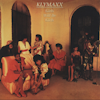It’s kind of amazing that despite their brief mid-’80s run of hit singles, Klymaxx aren’t widely recognized and cited as the pioneering all-female African American self-contained funk band that they are. We’re not talking about a girl group, but a girl band. It only makes sense that after a decade or so of buying records and attending concerts by the big male funk outfits of the ’70s, a group of young ladies blessed with instrumental, songwriting, and arranging skills should decide to get together and give it a shot themselves. And it took an ambitious and determined L.A.-based drummer named Bernadette Cooper to set the wheels in motion to make that a reality. Once Bernadette set her sights on making Black Girl Magic happen in band form, the usual process of classified ads and searching for members began in earnest, quickly yielding the likes of guitarist Cheryl Cooley, keyboardists Lynn Malsby and Robbin Grider, and vocalist Lorena Shelby. Much practicing and rehearsing followed, and local gigs, until a demo caught the attention of Solar Records honcho Dick Griffey, who agreed to sign them on the condition that they replace their bassist with a girl he knew from North Carolina: Joyce “Fenderella” Irby. With her arrival, all the parts finally fell into place and the ladies were ready to funk the world to its knees.
Their debut album, 1981’s Never Underestimate the Power of a Woman, should have attracted more attention simply for being the first major-label album by an all-female, all-Black funk band, but despite not matching the success of label mates like Shalamar, the Whispers, Lakeside, or Dynasty, it still proudly stands as a historical first and has aged very well. It was only a warm-up though, as one year later the band—with the help of Jimmy Jam and Terry Lewis on one of their first productions outside the Time—delivered what remains probably their finest album, 1982’s Girls Will Be Girls. Tighter and more confident than the debut, it’s an album that compares very favorably to anything else Solar was releasing at the time and demonstrates a band that has successfully harnessed all of its assets and has all bases covered. Though Jam and Lewis only produced four of the nine tracks, their guidance and encouragement clearly rubbed off on the ladies in all the best ways over the entire album. Their involvement inevitably brought a touch of the Minneapolis funk sound to the proceedings (like on standout cut “Wild Girls” for example) while still letting Klymaxx reach their full potential. Everything here is in plentiful supply: tight playing, hooks, memorable songs, and everything else great about early ’80s funk/R&B. Multiple songs here had serious urban hit single potential, such as the Joyce Irby–sung and coproduced “The Man in My Life,” which gives an early taste of her MJ-like vocals, which would later provide a major hit ballad for the band. And speaking of ballads, “Convince Me” and “Offer I Can’t Refuse” are particularly convincing ones, with shades of Earth, Wind & Fire classics like “That’s the Way of the World” and “Love’s Holiday.” Elsewhere, “Heartbreaker (I’m Such a Mess)” is an early appearance of the funk plus sassy diva spoken-word formula for which the band would later become best known on their breakthrough hits “The Men All Pause” and “Meeting in the Ladies Room” several years later. And you know an album is strong when even the closing track, in this case “Don’t Hide Your Love,” sounds like a radio-ready hit.
Overall, this album has so much potential that one can only speculate why Solar failed to break it. Gender bias from urban radio? Too much competition? Lack of involvement from Leon Sylvers III, who was the common thread among all the other successful Solar acts of the time? It’s anybody’s guess. Of course, Klymaxx finally struck gold (and platinum) on their next album, 1984’s Meeting in the Ladies Room, which was released on Griffey’s new MCA-distributed Constellation label and spawned three hit singles, and allowed Klymaxx to take their rightful place in history as the full-band Queens of Funk. But that later success also served to further obscure their two wonderful and pioneering earlier works for the Solar label, which are both richly deserving of reassessment and rediscovery, this classic sophomore effort in particular.


